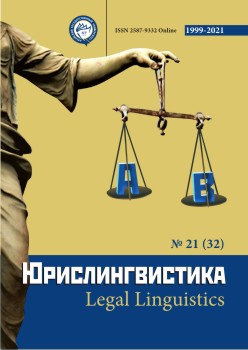The Ontological Nature of Gender Equality as a Philosophical and Legal Category
Abstract
This publication is aimed at gaining the insight into the concept of "gender equality". The article shows that the growing need for understanding the principle of gender equality at the philosophical and legal level is caused by the trends themselves within the changing legislation. The authors have specified that according to the generally accepted position, gender equality is understood as an absolutely identical range of opportunities. The participation and presence of both sexes in every area of society is an integral part of the legal equality of men and women. It is noted that value of women is heatedly discussed, as they are seen as an abnormal group from the point of view of a patriarchal society. All above is ultimately aimed at finding legal constructs that minimize the hierarchy of differences between the genders.
Downloads
References
Бутакова Я.С., Войнов В.П. Проблемы определения гендерного равенства / Актуальные вопросы современной науки. – 2009. – № 7. – C. 2.
Зорькин В.Д. Право против хаоса / Библиотечка «Российской газеты». – 2016. – № 13. Июль. – C. 176.
Ларинбаева, И.И. Юридическая онтология гендерного равноправия : автореф. дис. … канд. юр. наук. Саратов, 2004.
Шведова Н.А. Гендерное просвещение: просто о сложном − М. 2002.
References
Butakova, Ya.S., Voinov, V.P. (2009). Problems of determining gender equality. Actual problems of modern science No. 7. – Р. 2. Moscow (in Russian).
Larinbaeva, I.I. (2004) Legal ontology of gender equality: author. dis. ... Cand. legal entity sciences. Saratov,. (in Russian).
Shvedova, N.A. (2002). Gender education: simply about the difficult. Moscow (in Russian).
Zorkin, V.D. (2016). The right against chaos. Library of the "Russian newspaper". No. 13. July. P. 176. Moscow (in Russian).
Copyright (c) 2021 Александр Головинов, Юлия Головинова

This work is licensed under a Creative Commons Attribution 4.0 International License.
The authors, which are published in this journal, agree to the following conditions:
1. Authors retain the copyright to the work and transfer to the journal the right of the first publication along with the work, at the same time licensing it under the terms of the Creative Commons Attribution License, which allows others to distribute this work with the obligatory indication of the authorship of this work and a link to the original publication in this journal .
2. The authors retain the right to enter into separate, additional contractual agreements for the non-exclusive distribution of the version of the work published by this journal (for example, to place it in the university depository or to publish it in a book), with reference to the original publication in this journal.
3. Authors are allowed to post their work on the Internet (for example, in a university repository or on their personal website) before and during the review process of this journal, as this may lead to a productive discussion, as well as more links to this published work (See The Effect of Open Access).










